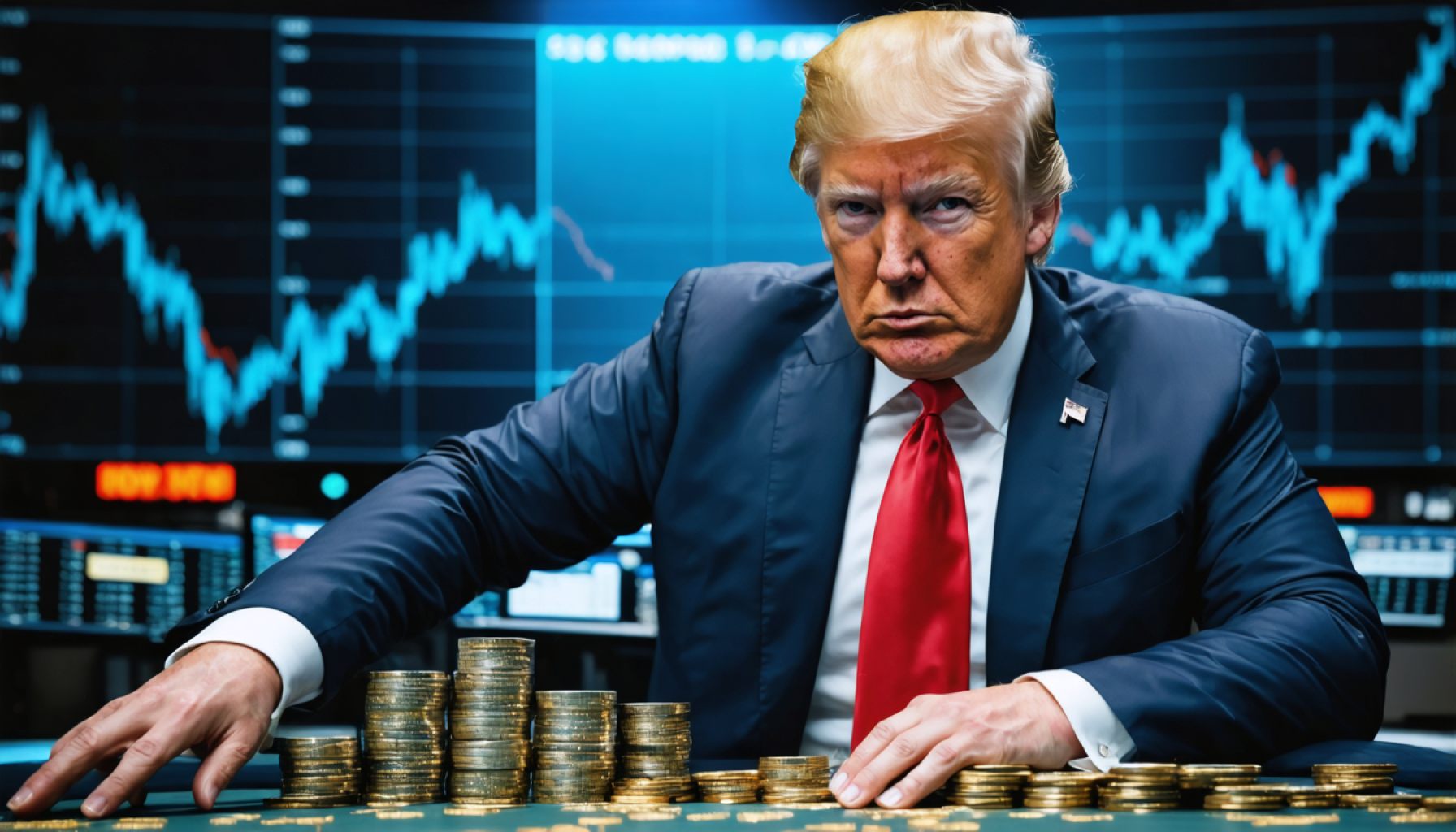- Video suggests Trump’s market crash is a deliberate strategy to influence Federal Reserve policies.
- Stock market experienced a significant 20% decline, triggering widespread financial concern.
- Conspiracy theory posits that the goal is to funnel cash into treasuries and prompt interest rate cuts by May.
- Trump’s aggressive trade tariffs, particularly with China, aim to bolster the US economy at the expense of foreign markets.
- US companies are encouraged to relocate operations domestically, potentially stabilizing jobs and reducing consumer prices.
- Video claims the strategy ultimately benefits the middle class by redistributing wealth from the top 8% of stockholders.
- Potential for lower interest rates could result in cheaper mortgages and refinancing benefits.
- The debate continues about whether Trump’s actions are strategic genius or reckless policy.
- Economics and politics are inextricably linked, requiring vigilance from both investors and the public.
Amid the tumultuous storm of global trade wars, a viral video has taken center stage, pulling back the curtain on a purported “secret game” helmed by US President Donald Trump. Like a master strategist in a high-stakes casino, Trump has been accused of orchestrating a deliberate market crash—a calculated plunge aimed at securing a unique economic advantage.
As the world watched in disbelief, the stock market took a 20% nosedive this month, sending shockwaves through the financial ecosystem. Yet, a parody account named AmericanPapaBear on the social media platform X suggests that this crash is no misstep, but a bold and ingenious maneuver. The narrative flirts with conspiracy, hinting that the president’s goal is to steer cash into treasuries, thereby compelling the Federal Reserve to slash interest rates come May.
Economists, the modern-day oracles, have long prophesied doom in the face of trade tariffs. Trump’s aggressive policies, especially those targeting China, have unsettled investor confidence. Massive tariffs on imports intend to not just shake foreign economies, but to strengthen domestic fortresses. Companies feel compelled to plant roots in America to dodge these fiscal landmines, while US farmers turn inward, potentially driving grocery prices down.
The video adds layers to this intrigue, suggesting that Trump’s strategy benefits the wider populace. With over 90% of stocks owned by a mere 8% of Americans, this purported transfer of wealth—taking from the rich, giving to the middle class—aims to alleviate economic disparity.
But is this realpolitik or just a fever dream? Debate rages among Wall Street wizards and policy pundits alike. Lower interest rates and a weaker dollar could indeed lead to cheaper mortgages and refinancing opportunities, encapsulating what Trump hopes many will see as his pièce de résistance.
This story leaves us with a poignant takeaway: the intersection of economics and politics has never been more theatrical or unpredictable. As players on this grand chessboard, investors and citizens alike must remain astute, armed with both skepticism and curiosity, as the market’s cards continue to unfold. Whether Trump’s “secret game” is visionary or reckless, only time will reveal the true hand.
Unmasking the Secret Economic Game: Is Trump’s Strategy a Masterstroke or Misstep?
In the midst of a global trade conflict, the political landscape is abuzz with speculation over U.S. President Donald Trump’s alleged economic strategy. Some claim it is a calculated ploy to realign economic dynamics, while others dismiss it as a conspiracy theory. As the stock market experiences a significant drop, let’s delve into the facts and analyses surrounding this financial turbulence.
Understanding the Strategy and Its Implications
Key Facts and Theories:
1. Trade Tariffs’ Role: Trump’s economic policies, particularly towards China, have introduced steep tariffs as a tool to protect and promote domestic manufacturing. According to a World Bank report, these tariffs can spur certain sectors of the American economy but also risk retaliation, causing global trade tensions.
2. Stock Market Crash Dynamics: The suggestion that a 20% market nosedive is strategic raises questions. Historical data from the Nasdaq indicates that market corrections can be beneficial, allowing for economic recalibration and preventing bubbles.
3. Interest Rates and Treasuries: Lower interest rates traditionally stimulate borrowing and spending. The idea is that by driving money into treasuries, the Federal Reserve would cut rates, thus catalyzing economic growth. This aligns with views from several economists who contend that lower rates can boost investment in a sluggish economy.
4. Wealth Redistribution: The theory that this might transfer wealth from the top 1% to the middle class is contentious. Data from the Brookings Institution shows that redistributive policies could reduce inequalities, but changes in asset values can have unintended consequences.
Navigating Controversies and Limitations
Pressing Questions:
– Is the economic trade-off beneficial for the average American?
– How sustainable is a low-interest-rate environment?
– Could this strategy prompt foreign economic retaliation?
Market Trends and Economic Predictions:
– Short-term vs. Long-term Effects: In the short term, market volatility might continue, but experts like those at Morgan Stanley suggest that businesses might adapt by reshoring supply chains.
– Inflation Concerns: The impact of tariffs and lower interest rates could stoke inflation fears. According to the International Monetary Fund, inflation trends must be closely monitored to avoid household purchasing power erosion.
Practical Advice for Investors
Actionable Recommendations:
1. Diversification: Spread your investments across sectors to mitigate risk.
2. Stay Informed: Keep abreast of policy changes and market analyses.
3. Assess Fixed Income Options: With potential interest rate cuts, it might be time to evaluate your bond portfolio for better yields.
Final Words
Economics and politics are inextricably linked, evolving into a complex theater. Whether Trump’s “secret game” is a strategic maneuver or speculative chaos is up for debate. As individuals and investors, maintaining a balance of skepticism and awareness is vital as this economic narrative unfolds.
For more insights into these intricate economic dynamics, consult resources like World Economic Forum or Financial Times for expert analyses and commentary.
